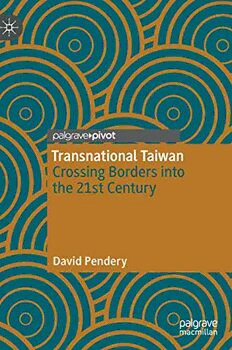
Transnational Taiwan: Crossing Borders into the 21st Century PDF
Preview Transnational Taiwan: Crossing Borders into the 21st Century
Transnational Taiwan David Pendery Transnational Taiwan Crossing Borders into the 21st Century David Pendery National Taipei University of Business Taipei, Taiwan ISBN 978-981-19-4367-6 ISBN 978-981-19-4368-3 (eBook) https://doi.org/10.1007/978-981-19-4368-3 © The Author(s), under exclusive license to Springer Nature Singapore Pte Ltd. 2022 This work is subject to copyright. All rights are solely and exclusively licensed by the Publisher, whether the whole or part of the material is concerned, specifically the rights of translation, reprinting, reuse of illustrations, recitation, broadcasting, reproduction on microfilms or in any other physical way, and transmission or information storage and retrieval,electronicadaptation,computersoftware,orbysimilarordissimilarmethodology now known or hereafter developed. The use of general descriptive names, registered names, trademarks, service marks, etc. in this publication does not imply, even in the absence of a specific statement, that such namesareexemptfromtherelevantprotectivelawsandregulationsandthereforefreefor general use. Thepublisher,theauthors,andtheeditorsaresafetoassumethattheadviceandinforma- tion in this book are believed to be true and accurate at the date of publication. Neither the publisher nor the authors or the editors give a warranty, expressed or implied, with respecttothematerialcontainedhereinorforanyerrorsoromissionsthatmayhavebeen made.Thepublisherremainsneutralwithregardtojurisdictionalclaimsinpublishedmaps and institutional affiliations. Cover illustration: © John Rawsterne/patternhead.com This Palgrave Macmillan imprint is published by the registered company Springer Nature Singapore Pte Ltd. Theregisteredcompanyaddressis:152BeachRoad,#21-01/04GatewayEast,Singapore 189721, Singapore This book is dedicated, as always, to my mother, wife, and daughter. And in remembrance of my father, Donald Bruce Pendery (1932–1976), who gave me intellectual curiosity. This work, as my other Taiwan studies, is also for the people of Taiwan. Preface I did not plan to write this foreword, but when a scholar I know promised, and then refused to do so, it became necessary. I will not go into great detail about our topic here—Taiwan’s (and the world’s) transnational character—as I will go into that in detail in the pages that follow. To approach it simply, this is a highly important topic in today’s global ecosystem, the international relations that we are so fully involved in, with Taiwan’s prickly position therein always at the forefront of any analyses.WhetherTaiwancanbetakenintothiscontext“transnationally” (that is, “nationally”) at all, is, to say the least, an open question—not leastbecauseofChina’sobstinate,oftenrecklessobstruction(Iusealess- than-combative description). I have considered just this question often in my books, editorials, and comments. Without probing into yet more detail here, the simple question remains: To what extent can Taiwan be considered “transnational” in international conceptions and contexts today? Given my previous commentary, I need hardly to say further that Taiwan can be considered just this. This “nation,” with all of its rich history (political, economic, social, etc.), linguistic diversity and peoples (not least indigenous), varied cultures and interlopers of all kinds within its borders, unique geography, interaction in world trade, its own laws, customs,norms,identity,andafunctioninggovernment—isinmorethan a sturdy position to be seen as very much, very opulently, very amply, “transnational,”whatever gripes and censure come from the “other side” of this discussion. And that probably says it all, and introduces just how vii viii PREFACE wewillenterinto,discuss,analyze,andwhollyembracethissubject.That which is transnational has become that which is wholly that which is life, polity, community, and yes, “state” in today’s international environment and setting. And so, let’s explore how Taiwan (and a good bit of the rest oftheworld)fitsintojustthismilieu.Thetransnationaltimeisnow,let’s embrace it for all it is worth, for all it has to offer, in Taiwan and all around the world. Taipei, Taiwan David Pendery Contents 1 Transnationalism: An Overview and a Look at Taiwan 1 2 Out of Taiwan: A Transnational Take 15 3 The Silk Road: The First Appearance of Transnationalism? 21 4 Colonialism, Imperialism: The Next Phase of Transnationalism 27 5 Out of SE Asia: A New Transnational Network 35 6 Transnational Experience: Indigenous Peoples, Reprise 47 7 Transnational Governance 55 8 Taiwan and Transnational Governance 65 9 Transnational Migration 77 10 Transnational Business and Work 85 11 Transnational Subjectivity 91 12 Transnational Conflict, Security, and Militarization 99 13 Stephen Toulmin’s View on Transnationalism 115 14 Transnational Education 123 ix x CONTENTS 15 My Taiwanese Students Speak 129 16 Conclusion 133 Sources Cited 137 Index 147 About the Author DavidPendery wasborninCincinnati,Ohioin1960.Herelocatedwith his family to Albuquerque, New Mexico at the age of nine, and grew up there. He moved to San Francisco in 1984, and obtained a B.A. in Inter- national Relations at San Francisco State University, and later an M.S. in JournalismatBostonUniversity.Helivedandworkedasatechnicianand writer in these cities until 2000, when he relocated to Taipei, Taiwan. Here he has worked as an English consultant, teacher, journalist, and editor. He obtained his Ph.D. in English literature and historiography at National Chengchi University in Taipei. He is currently an associate professor in the Department of Applied Foreign Languages at National Taipei University of Business. He is married to a Taiwanese woman, and they have a six-year-old daughter. xi
